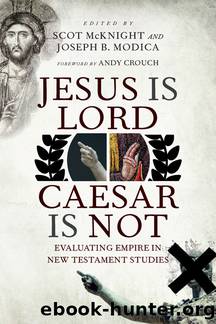Jesus Is Lord, Caesar Is Not by McKnight Scot;Modica Joseph B.;Crouch Andy;

Author:McKnight, Scot;Modica, Joseph B.;Crouch, Andy; [McKnight, Scot]
Language: eng
Format: epub
Publisher: InterVarsity Press
Published: 2012-11-30T00:00:00+00:00
6
Proclaiming Another King Named Jesus?
The Acts of the Apostles and the Roman Imperial Cult(s)
Drew J. Strait
Recent events in the Middle East have inspired a new level of sophistication for critiquing political tyrants. Before the eyes of the watching world, the peoples of Tunisia and Egypt organized resistance movements not through violence but through Internet networking sites such as Twitter and Facebook. In a world far removed from the Internet, the early Christians too lived under the shadow of a regimeâthe Roman Empire. At the heart of the Roman Empire stood the towering figure of Caesar, whose unprecedented control of power and bestowal of peace and material benefits to his subjects inspired him to be âworshiped as a god.â Before and contemporaneous with the early Christian movement, the worship of Caesar evolved into a widespread political and religious institution called the Roman imperial cult. The significance of the imperial cult is evident in the many temples, statues, coins, inscriptions and other media that have been uncovered by archaeologists in many of the cities that dot the missionary itineraries of Paul in the book of Acts. In the city of Myra, where Paul changed ships on his way to Rome (Acts 27:5), an inscription honoring the emperor Tiberius after his death reads: âThe people of Myra [honor] the emperor Tiberius, the exalted god, son of exalted gods, lord of land and sea, the benefactor and savior of the entire world.â[1] One has to wonder if Lukeâs emphasis on Jesus as the Son of God, Lord and Savior is in response to inscriptions like this, making clear that such titles belong to Jesus and not to Caesar. Indeed, over the past twenty years it has become increasingly popular among scholars to argue that the New Testament is embedded with so-to-speak anti-imperial âTweetsâ that communicate that Jesus is Lord and Caesar is not. What follows is an evaluation of Lukeâs attitude toward Caesar in the book of Acts or, better yet, a journey through the Roman roads and open seas of Acts, with the aim of interpreting whether or not Luke intentionally presented Jesus as Lord against Caesar.
As the only author in the New Testament to acknowledge Roman emperors by name (e.g., Augustus [Lk 2:1], Tiberius [Lk 3:1] and Claudius [Acts 11:28; 18:2]), one would think that, if Luke is anti-imperial, he would explicitly critique Caesar. Ironically, when one travels down the Roman roads and open seas of Acts, the presence of Jewish Diaspora synagogues and Greek pagan cults take center stage rather than Roman imperial temples and statues of Caesar. The lack of interaction with Caesar in Luke-Acts has led to a scholarly consensus for the past three centuries that Luke is the most pro-Roman author in the New Testament. Lukeâs purportedly positive portrayal of Roman officials and characterization of Paulâs innocence in Roman custody inspired numerous scholars to argue, in one way or another, that Luke wrote a political apology on behalf of the church to show Roman officials that Christianity is politically harmless (apologia pro ecclesia).
Download
This site does not store any files on its server. We only index and link to content provided by other sites. Please contact the content providers to delete copyright contents if any and email us, we'll remove relevant links or contents immediately.
Getting It, Then Getting Along by L. Reynolds Andiric(610)
Global Justice, Christology and Christian Ethics by Lisa Sowle Cahill(386)
Religion and Politics Beyond the Culture Wars : New Directions in a Divided America by Darren Dochuk(385)
Positive Psychology in Christian Perspective: Foundations, Concepts, and Applications by Charles Hackney(323)
Forgiveness and Christian Ethics by Unknown(308)
Douglas Hamp The First Six Days by Unknown(210)
Christian Martyrdom and Christian Violence by Matthew D. Lundberg;(201)
The Oxford Handbook of Greek and Roman Mythography by R. Scott Smith;Stephen M. Trzaskoma;(194)
Beyond Heaven and Earth by Gabriel Levy(188)
God and Eros by Patterson Colin;Sweeney Conor;(187)
The Bloomsbury Reader in Christian-Muslim Relations, 600-1500 by David Thomas;(186)
Insurgency, Counter-insurgency and Policing in Centre-West Mexico, 1926-1929 by Mark Lawrence(184)
The Horrors and Absurdities of Religion by Arthur Schopenhauer(178)
Autobiography, Volume 2: 1937-1960, Exile's Odyssey by Mircea Eliade(171)
Cult Trip by Anke Richter(171)
Witches: the history of a persecution by Nigel Cawthorne(169)
The Myth of Disenchantment by Jason A. Josephson-Storm(156)
An Introduction to Kierkegaard by Peter Vardy(154)
The Believer by Sarah Krasnostein(150)
